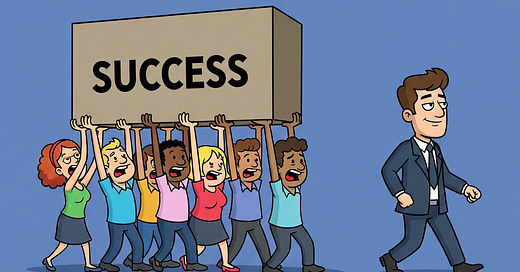This post is one day late and much better than the original. It is 648 words, about a 3-minute read. Enjoy!
I hate asking for help. I don't like feeling dependent on anyone for anything. I want to live life on my own terms, free from the perceived constraints of other humans. The problem is, this is impossible. From the day we are born until the day we die, we rely on others for support.
In the U.S., there's a strong belief in rugged individualism. This is the idea that a person can pull themselves up by their bootstraps with nothing but resilience and a can-do attitude. They believe in themselves, pushing relentlessly until they reach the nirvana of wealth and success. A perfect example of this is Elon Musk. We praise him as a self-made visionary who single-handedly pushed the world into electric vehicles by force of will alone.
That's not the full picture. His will, vision, and drive are undeniable. However, Tesla was not a company he built on his own. The original Tesla Roadster had nothing to do with Elon. It was built on the foundation of an existing Lotus Elise chassis. The electric drivetrain was not something Elon came up with. It was a group of engineers working on it in their free time before Musk fully took the reins. And as Tesla scaled, the company could only survive through the reliance on government contracts and subsidies, not individual effort or private capital.
The truth is, almost no one—and I dare say no one—actually achieves monumental success entirely on their own. Most of the time, countless people along the way have aided that person in reaching their destination and accomplishing their goals.
As some of you may know, I'm currently in the middle of wedding planning. The one thing I absolutely did not want to do was ask anyone for anything. My wife is the exact opposite; she's willing to ask and see if it's possible that someone would do something for us. As she puts it, "Why should I be blocking the blessings that God might want to give us through people?"
That's a hard pill for me to swallow, especially for an event like a wedding, which in my mind, felt like something I should handle entirely myself. In my mind, I keep thinking, "Well, I can cover that," or "We have the money for X," or "We can just not do Y." In the process, I limit the dream and make myself smaller. Ironically, this leads to more stress and less happiness.
Especially as I've accumulated more financial resources, I easily start retreating and making myself feel self-sufficient. This is, in my opinion, one of the worst ways to live life.
The truth is, it's all my pride talking. This comes from my need for control but fear of vulnerability. I do not like to feel needy.
I love a quote from Prof G (Scott Galloway): "Greatness is in the agency of others."
You have to be relentless in asking for what you want. This doesn't mean you shirk your own responsibilities, but rather you allow others to enter the picture and help you on your journey.
The reality is, people want to show up for you. People want to support you. People want to let you know they appreciate you. Offering help can strengthen bonds and foster a sense of community. The more we refuse to allow that to happen, the more we push people away.
The greatest irony is that we all want to be the person who shows up for others. Yet, we don't want to provide the same space for others to show up for us. I love what Simon Sinek says: "How dare you be so selfish as to deny me the honor of being there for you in your time of need?"
Generosity>greed
✌🏾
Recommendation Section
Nick Maggiulli in "You Can't Put a Price on Mental Freedom", talks about the cost of active investing on our attention. He compares it to social media's increasing control over every aspect of our life. A few great exerts:
The real cost of active investments isn’t the likely underperformance or the existential dread, it’s the mental distraction you create for yourself. It’s the time you could’ve been doing things you’re probably better at.
We are being pacified with digital bread and circuses while the owners of these platforms continue to get wealthier and more powerful. And they are using those resources to further entrench themselves in the media, the government, and other parts of our lives.
Kyla Scanlon in "Economic Lessons from the Screwtape Letters", talks about ... You know its just better to put it in her words:
As I was reading it, and reflecting on now, it increasingly felt like we are in a version of Screwtape’s Economy. On each page, there is a lesson, ranging what we do versus what happens to us, the focus on the future instead of the present, the rot of letting feelings fester, how distorted reality can become from manipulation of truth, a spiritual economy built on slow erosion.
So I want to explore rejection, convenience, and a lack of surprise through this lens - building a bit on my friction piece, but through the eyes of CS Lewis, and the lessons we are eternally learning about what an economy is beyond money.
Read iT!!



